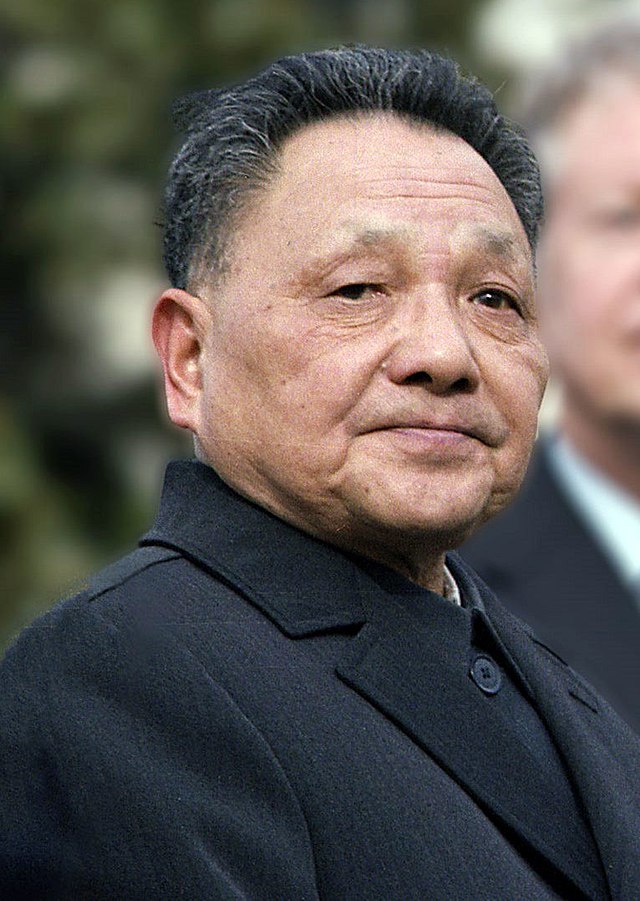Deng Xiaoping: Difference between revisions - Wikipedia
 Article Images
Article Images
Content deleted Content added
Remsense 42,859 edits m |
|||
Line 104: }} '''Deng Xiaoping''' ({{zh|s=邓小平}};{{efn|{{IPAc-en|ˈ|d|ʌ|ŋ|_|ʃ|aʊ|ˈ|p|ɪ|ŋ}}, {{IPAc-en|alsoUK|ˈ|d|ɛ|ŋ|_|-|,_|-|_|ˈ|s|j|aʊ|p|ɪ|ŋ}};<ref>{{Cite dictionary |title=Deng Xiaoping |url=https://www.collinsdictionary.com/amp/english/deng-xiaoping |url-status=live |archive-url=https://web.archive.org/web/20190604031142/https://www.collinsdictionary.com/amp/english/deng-xiaoping |archive-date=4 June 2019 |access-date=8 March 2019 |dictionary=Collins English Dictionary |publisher=HarperCollins}}</ref><ref>{{Cite web |title=Deng Xiaoping |url=https://en.oxforddictionaries.com/definition/us/deng_xiaoping |url-status=dead |archive-url=https://web.archive.org/web/20190604031146/https://en.oxforddictionaries.com/definition/us/deng_xiaoping |archive-date=4 June 2019}} (US) and {{Cite encyclopedia |url=http://www.lexico.com/definition/Deng+Xiaoping |archive-url=https://web.archive.org/web/20190308000000/http://www.lexico.com/definition/Deng+Xiaoping |url-status=dead |archive-date=2019-03-08 |title=Deng Xiaoping |dictionary=Oxford UK English Dictionary |publisher=[[Oxford University Press]]}}</ref><ref>{{Cite Merriam-Webster|Teng Hsiao-p'ing |access-date=8 March 2019}}</ref> {{zh|s=邓小平|t=|p=Dèng Xiǎopíng}} also [[Romanization of Chinese|romanised]] as '''Teng Hsiao-p'ing''';<ref>{{Cite web |date=August 1976 |title=Mao's last hurrah: the campaign against Teng Hsiao-Ping |url=https://www.cia.gov/readingroom/docs/CIA-RDP79T00889A000800030001-8.pdf |archive-url=https://web.archive.org/web/20210413100236/https://www.cia.gov/readingroom/docs/CIA-RDP79T00889A000800030001-8.pdf |archive-date=13 April 2021 |publisher=[[CIA]]}}</ref> born '''Xiansheng''' ({{lang|zh|先圣}}). {{Family name explanation|[[Deng (Chinese surname)|Deng]]|lang=Chinese}}}} 22 August 1904{{snd}}19 February 1997) was a Chinese revolutionary and statesman. He served as the [[paramount leader]] of the [[People's Republic of China]] (PRC) from 1978 to 1989. After [[Death and state funeral of Mao Zedong|the death]] of [[Mao Zedong]] in 1976, Deng rose to power and led China through a period of [[Reform and Opening Up]] that transformed China's economy into a [[socialist market economy]]. Deng was born in [[Sichuan]] during the final years of the [[Qing dynasty]]; he first became interested in [[Marxism-Leninism]] in the 1920s while studying abroad in France. In 1924, he joined the [[Chinese Communist Party]] (CCP), traveled to Moscow to continue his studies, and subsequently returned to China, where he became a [[political commissar]] in the Red Army. Deng was a key member of CCP leadership during the [[Chinese Civil War]], exemplified by the part he played in the Communists' survival during the [[Long March]]. He later helped to lead the [[People's Liberation Army]] (PLA) to victory in the civil war, including participating in the PLA's capture of [[Nanjing]]. | |||